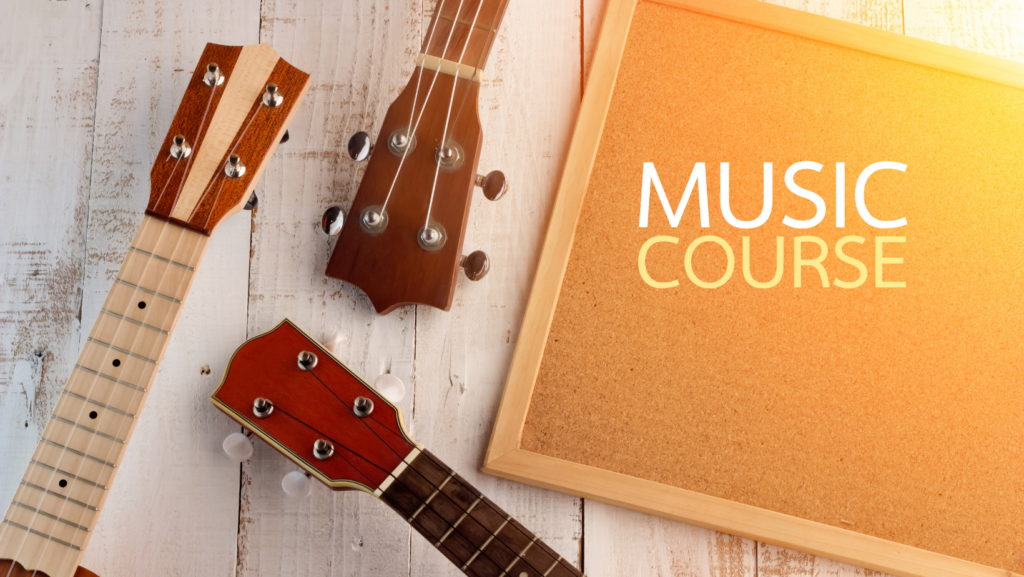In the symphony of the digital age, music technology courses are hitting all the right notes. They’re the perfect blend of rhythm and code, offering a unique path for those passionate about both music and technology.
So, let’s dive into the world of music technology courses, and explore how they’re changing the tune of the music industry.
Music Technology Courses
 In present times, music technology courses go beyond just teaching software skills. They explore several critical areas that can equip participants to thrive in the current music industry.
In present times, music technology courses go beyond just teaching software skills. They explore several critical areas that can equip participants to thrive in the current music industry.
The first component is audio recording and editing. Despite rapid technological advancements, the principles of audio recording and editing remain crucial
Popular Music Technology Courses in 2023
 Building on the solid foundation of the past, here are some popular Music Technology Courses in the year 2023. They showcase the dynamic fusion of technology and artistry, with an emphasis on hands-on training and real-world experience.
Building on the solid foundation of the past, here are some popular Music Technology Courses in the year 2023. They showcase the dynamic fusion of technology and artistry, with an emphasis on hands-on training and real-world experience.
University Programs
Some universities, famous for their forward-thinking curriculum and world-class faculty, got the limelight in 2023 for their Music Technology programs. Berklee College of Music still leads the pack with its Music Production and Technology degree. It focuses on mastering sound design, digital audio workstation proficiency, and music information retrieval.
| University | Course | Highlights |
| Berklee College of Music | Music Production and Technology Degree | Sound Design, Digital Audio Workstation Proficiency, Music Information Retrieval |
| New York University’s Steinhardt Department | Music Technology Program | Computer Music Composition, Concert Recording, Instrumental Digital Interaction, Musical Acoustics |
| University of Michigan School of Music, Theatre & Dance | Bachelor of Science in Sound Engineering | Sound Reinforcement, Studio Recording, Electronics |
Online Learning Platforms
For those aspiring to explore the world of Music Technology from their homes, numerous online platforms offered courses in 2023 that gained popularity. Coursera has been in the spotlight with “Producing Music with Ableton Live,” offering a comprehensive understanding of the software. Other courses like “Introduction to Music Production” and “The Art of Music Production” also created waves on Coursera.
| Online Learning Platform | Course | Key Features |
| Coursera | “Producing Music with Ableton Live” | Software Proficiency |
| “Introduction to Music Production” | Basic Production Techniques | |
| “The Art of Music Production” | Advanced Production Techniques | |
| Udemy | “Music Composition for Film and TV” | Scoring for Visual Media |
| “Learn Pro Tools from A to Z” | Pro Tools Proficiency | |
| MasterClass | Hans Zimmer’s Film Scoring Class | Creative Process of Film Scoring |
Skills Gained from Music Technology Courses
From digital audio workstation mastery to sound design, music technology courses arm students with a diverse skill set. The article further explores the specific technical and creative skills these programs offer.
Technical Skills
 Students, through rigorous training, gain proficiency in digital audio workstations like Ableton Live, Pro Tools and Logic Pro X. Mastery in manipulating audio tracks, simplifying complex sound layers, and producing music is part of this skill enhancement. It’s also not unlikely for scholars to become adept at creating digital scores, a necessity in contemporary music. Sound design, a critical component of both film and music industry, becomes less enigmatic through intensive workshops.
Students, through rigorous training, gain proficiency in digital audio workstations like Ableton Live, Pro Tools and Logic Pro X. Mastery in manipulating audio tracks, simplifying complex sound layers, and producing music is part of this skill enhancement. It’s also not unlikely for scholars to become adept at creating digital scores, a necessity in contemporary music. Sound design, a critical component of both film and music industry, becomes less enigmatic through intensive workshops.
Creative Application
Memory training isn’t the only focus in music technology programs. These courses also nurture creative application. Students acquire abilities that allow them to put the right sounds together, crafting harmonies that elicit specific emotional responses. The Faculty of NYU’s Music Technology program and other similar institutions enforce practical engagement with software, compelling learners to create original music compositions.
Final Thoughts
Music technology courses have undoubtedly transformed the landscape of the music industry. They’ve opened up a world of opportunities, from traditional roles like Audio Engineer and Music Producer to emerging positions like Sound Designer and Studio Manager. The right course can not only equip students with the skills required in the digital age but also shape their career paths. Online platforms and renowned universities alike offer comprehensive programs, ensuring there’s a course for every interest and goal. Success stories of graduates underscore the value of these courses. The future of music is technology-driven, and these courses are the keys to unlock that future.

